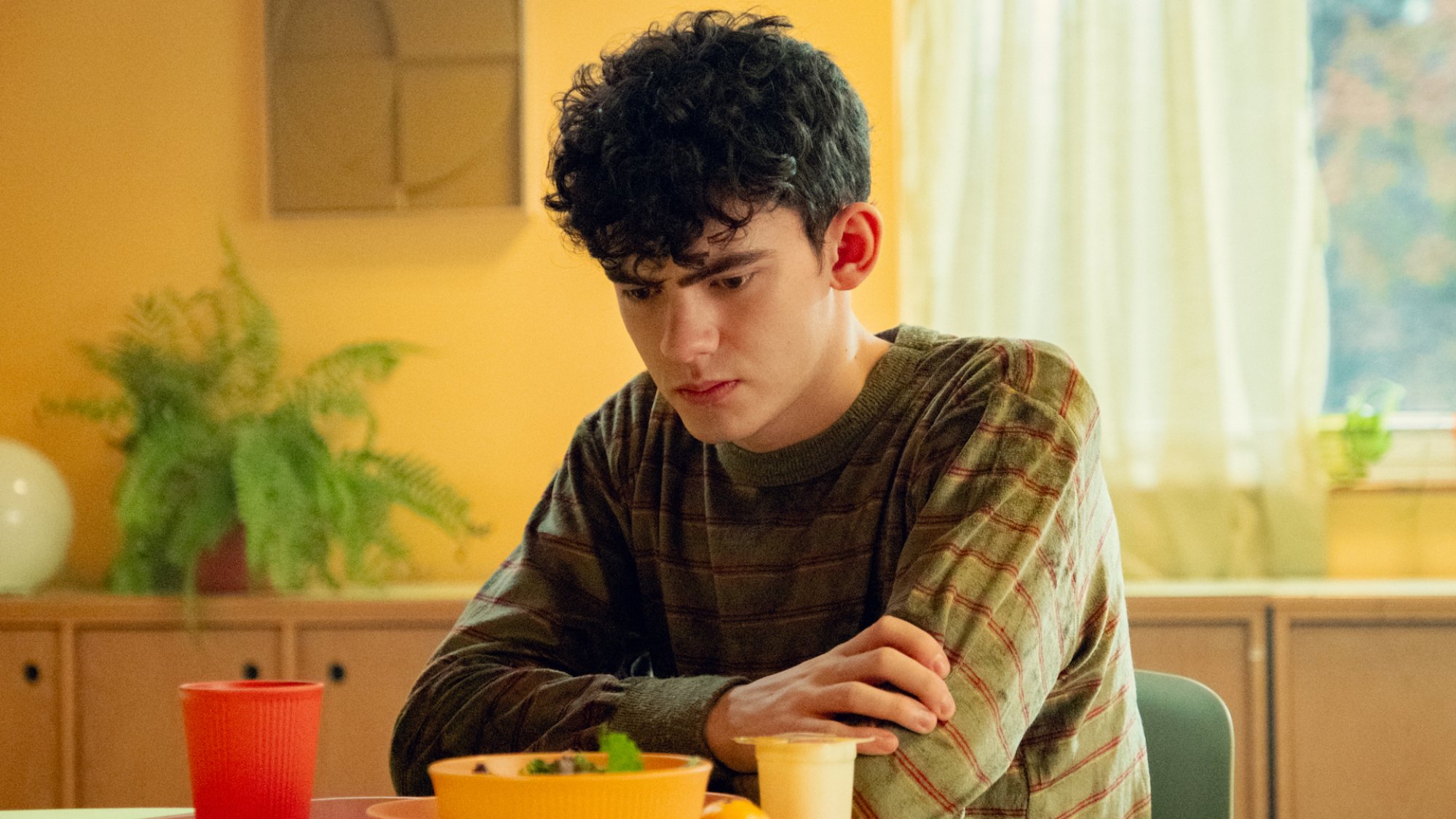This review discusses eating disorders and body dysmorphia.
Heartstopper, you’ve grown up.
A compassionate, gentle exploration of identity, mental health, and early sexual experiences, the Netflix adaptation of Alice Oseman’s graphic novel feels more mature in Season 3, all while maintaining its signature sweetness. Season 2 focused on the complexities of coming out, specifically Nick’s (Kit Connor) journey through understanding his bisexuality. And this season, directed by Andy Newbery, the series sees Charlie (Joe Locke) through an immensely challenging time with anorexia and his mental health.
6 things teens say they really need for their mental health
On the teen series spectrum, Heartstopper has always felt like a younger sibling of Sex Education, a less dramatic companion of Never Have I Ever, and the polar opposite of darker teen shows like Skins or Euphoria. And this season, though the characters move further into maturity, Heartstopper maintains its tendency for tenderness through life’s complicated turns. The “Paris Crew” face a lot individually this season, each grappling with the difficult task of asking for help, but ultimately finding love and support within their found family — and getting their first hangovers together.

With the cast at their best yet, Heartstopper once again proves why it’s one of the top teen shows on TV.
Heartstopper Season 3 presents Charlie as more than his disorder, while showing the realities of anorexia.

Joe Locke as Charlie.
Credit: Samuel Dore / Netflix
Screen portrayals of eating disorders are rarely commendable on screen, with shows like Netflix’s To the Bone completely missing the mark. Last year, Ripley Parker’s Everything Now actually managed a miracle, approaching the realities of eating disorders (specifically anorexia), social anxiety, and body dysmorphia with respect and nuance — and an excellent performance by Talk to Me’s Sophie Wilde.
Heartstopper has been slowly and sensitively incorporating Charlie’s struggle with an eating disorder since Season 1, but this season, his undiagnosed anorexia and declining mental health become overwhelming for him. As in Season 2, Heartstopper subtly and tactfully shows how difficult everyday situations can be for Charlie: a picnic with friends, a casual crisp offer at lunch, a day at the beach in swimming costumes. Locke is expertly understated and nuanced in his portrayal of Charlie’s concealed pain, with Oseman’s animated illustrations helping to convey his inner tension. Episode 4, one of the best episodes of the season (and of the year, in my opinion) shows Charlie’s decision to ask for help and get treatment through both his and Nick’s points of view in their journals. It’s a sensitive insight into a very interior struggle.

Kit Connor as Nick.
Credit: Samuel Dore / Netflix
At the same time, the show portrays the complexities of caring for someone you love who has an eating disorder. Connor is superb this season, conveying Nick’s deep feelings for Charlie but also his deep fear over getting things wrong — there’s a brilliant scene involving a conversation with Nick’s kick-ass Aunt Diane (welcome series addition Hayley Atwell) about not needing to have all the answers; it should be mandatory viewing. Thankfully, the series also gives us way more time with Charlie’s concerned, stoic sister Tori (Jenny Walser), Oseman’s original protagonist, meaning some brilliant scenes between Locke and Walser. And through some deeply moving moments — I’m still recovering from Tao’s (William Gao) film project for Charlie — we see Charlie’s friends turn up for him, too.
Mashable Top Stories
Like Everything Now, Heartstopper shows that Charlie’s recovery isn’t without setbacks, especially when he returns home from treatment. His family often does say the wrong thing, and Charlie’s frustration at being treated as “fragile” results in understandable anger. Importantly, Heartstopper tackles another considerable issue for people living with eating disorders: body dysmorphia and anxiety over body image, especially when it comes to sex.
Heartstopper approaches early sexual experiences with trust, respect, and curiosity.

Yasmin Finney and William Gao as Elle and Tao.
Credit: Samuel Dore / Netflix
Having set itself apart from other teen dramas as more sugary and PG, Heartstopper has somewhat distanced itself from conversations around sex. Season 1 was about as far away from the frank likes of Sex Education as you could get, and Season 2 only hinted at the possibility of characters taking things further. But this season, Heartstopper is all raging hormones, while maintaining the show’s well-worn status as a safe, nonjudgmental, pressure-free space. It’s incredibly refreshing to see insecurity in intimacy met with compassion.
In Season 3, as in Oseman’s graphic novel, the characters tentatively figure out their sexual desires and boundaries in very sweet scenes. Charlie and Nick, who left the “L” word hanging at the end of Season 2, fall headfirst into their feelings and desires this season, namely figuring out if they’re ready for their first sexual experiences. While Connor and Locke thrive in realizing their characters’ complex inner turmoils alone, together they’re dynamite romantic leads.
Like Sex Education, Heartstopper makes plain the crisis of sex education in the UK through complete classroom nonsense (yes, we’re talking cucumbers and condoms). But by learning from one another with trust and respect, the Paris Crew stumbles through their first experiences with apprehension, curiosity, and patience. That is, when their parents and siblings aren’t barging in on them.
The rest of the Paris Crew go through it, too.

There’s a lot going on for everyone this season.
Credit: Samuel Dore / Netflix
Charlie and Nick aren’t the only ones managing maturity and heavier things this season; Elle (Yasmin Finney) navigates gender dysphoria, Darcy (Kizzy Edgell) explores their gender identity and trying new pronouns, Tara (Corinna Brown) struggles with anxiety, Imogen (Rhea Norwood) confronts her internalized heteronormativity, and Isaac (Tobie Donovan) combats loneliness among his coupled-up friends while further exploring his asexuality.
Finney is a particular highlight this season, with Elle’s sense of identity really tested publicly and privately. When Elle unpacks her gender dysphoria being triggered with Tao, the conversation is comfortable and respectful. But when she’s lambasted on a community radio show with anti-trans rhetoric, Elle’s sense of herself is rattled, and Finney gives her best performance yet. “It feels like the whole world is against me,” she tells Tao, and it’s not out of place, with trans young people continuing to face abuse, harassment, and discrimination on a daily basis in the UK.
Ultimately, Heartstopper shifts into more grown-up territory this season, to moving and enlightening effect. And the show manages to do so while maintaining the sense of curiosity and compassion that makes Oseman’s comics so relatable and enduring. With the cast at their very best yet, it’s another superb season for Heartstopper, one we’re delighted to say “hi” again to.
Heartstopper Season 3 is streaming on Netflix Oct. 4.
If you feel like you’d like to talk to someone about your eating behavior, in the U.S. you can call the National Eating Disorder Association’s helpline at 800-931-2237. You can also text “NEDA” to 741-741 to be connected with a trained volunteer at the Crisis Text Line or visit the nonprofit’s website for more information.
In the UK, you can contact Beat through webchat, email, or phone — England (0808 801 0677), Scotland (0808 801 0432), Wales (0808 801 0433) Northern Ireland (0808 801 0434). The helplines are open 3 p.m. to 8 p.m, Monday to Friday.




